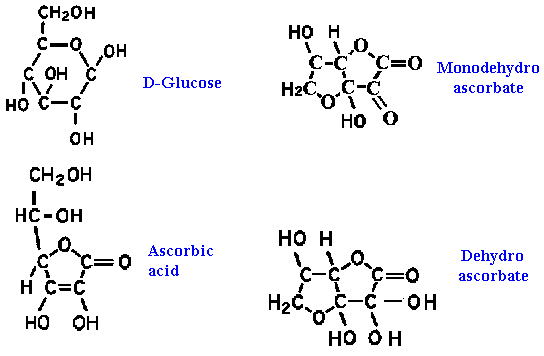COLLAGEN - Vitamin C is necessary for the manufacture
of collagen, the protein which forms the basis of connective tissue.
The most abundant tissue in the body, connective tissue acts as
a cementing substance between cells. It helps support and protect
blood vessels, bones, joints, organs and muscles and forms a sizeable
proportion of skin, tendons, the cornea of the eye, ligaments,
cartilage, teeth and bone. Collagen forms a protective barrier
and promotes healing of wounds, fractures and bruises.
ANTIOXIDANT - Vitamin C is the body's most powerful water
soluble antioxidant and plays a vital role in protecting the body
against oxidative damage. It neutralizes potentially harmful reactions
in the watery parts of the body such as the blood and the fluid
inside and surrounding cells. It helps protect LDL cholesterol
against free radical damage. This antioxidant action helps to
protect the health of the heart and an array of other body tissues.
HORMONES - Vitamin C is important in the synthesis of hormones
by the adrenal glands.
CARDIOVASCULAR SYSTEM - Vitamin C plays a role in cholesterol
production in the liver and in the conversion of cholesterol to
bile acids for excretion. It supports normal total blood cholesterol
and LDL cholesterol and raises beneficial HDL cholesterol. Vitamin
C also supports normal circulation, therefore supporting the health
of the heart. Vitamin C also helps control healthy blood pressure.
NERVOUS SYSTEM - Vitamin C plays a role in the conversion
of tryptophan to serotonin, a neurotransmitter with many vital
functions.
Absorption: Body tissue stores of vitamin C are small and easily
saturated, with any excess excreted in two to three hours.
CARDIOVASCULAR SYSTEM - Vitamin C may
protect the heart by preventing the oxidation of artery clogging
LDL cholesterol. Studies have shown that high vitamin C intake
is linked to heart health. Vitamin C may also be of benefit in
the support of normal high blood pressure and circulation.
LUNGS - There is some evidence that
vitamin C may be of benefit in maintaining the health of the respiratory
system. This effect may be due to the antioxidant effect of vitamin
C on oxidizing agents. Vitamin C may also improve lung and white
blood cell function and decrease respiratory stress.
IMMUNITY - Vitamin C boosts immunity
by increasing the production of B and T cells and other white
blood cells, including those with a critical role in natural defenses.
It also increases interferon levels and antibody responses and
has antiviral and antibacterial effects. These immune stimulating
effects lead to improved resistance against infections. Vitamin
C may reduce the duration of colds and the severity of cold symptoms
such as sneezing, coughing and sniffling by reducing blood levels
of histamine which can trigger tissue inflammation and runny noses:
though the research is contradictory and inconclusive. It may
also protect the immune cells and surrounding tissue from oxidative
reactions that occur when cells fight bacteria.
CATARACTS - Many studies show that vitamin
C may protect the health of the eye, possibly by reducing ultra
violet damage. Vitamin C is highly concentrated in the lenses
of normal eyes which may contain 60 times the amount of vitamin
C as the blood, while stressed lenses have levels that are much
lower. Vitamin C may act to protect the lens from oxidative damage
and protect enzymes within the lens that remove oxidation damaged
proteins.
DIABETES - Increasing vitamin C intake
in diabetics may support circulation, especially micro-circulation.
OTHER BENEFITS - Vitamin C may also
protect the skin from sun damage, improve response to stress including
an improvement in athletic performance due to the effects on adrenal
hormones.
Interactions: Vitamin C helps in the body's absorption
of iron by helping convert dietary iron to a soluble form. It
is also involved in the conversion of folic acid to its active
state. Vitamin C deficiency may lead to increased excretion of
vitamin B6 and vitamin B6 deficiency leads to low levels of vitamin
C as can a deficiency of vitamin A. Vitamin C protects against
the toxic effects of cadmium, copper, vanadium, cobalt, mercury
and selenium. Large doses of vitamin C may lower vitamin B12,
copper and selenium blood levels. Calcium and manganese supplements
may decrease vitamin C excretion and vitamin C supplements may
increase manganese absorption.
Exposure to cigarette smoke or air pollutants
such as ozone and carbon monoxide may deplete vitamin C in the
lungs.
Large doses of vitamin C may interfere with
contraceptive pill absorption and reduce its effectiveness.
Aspirin, alcohol antibiotics and steroids may
increase vitamin C requirements.
Vitamin C may diminish the response to some
antidepressants, and the anticoagulant drug warfarin.

